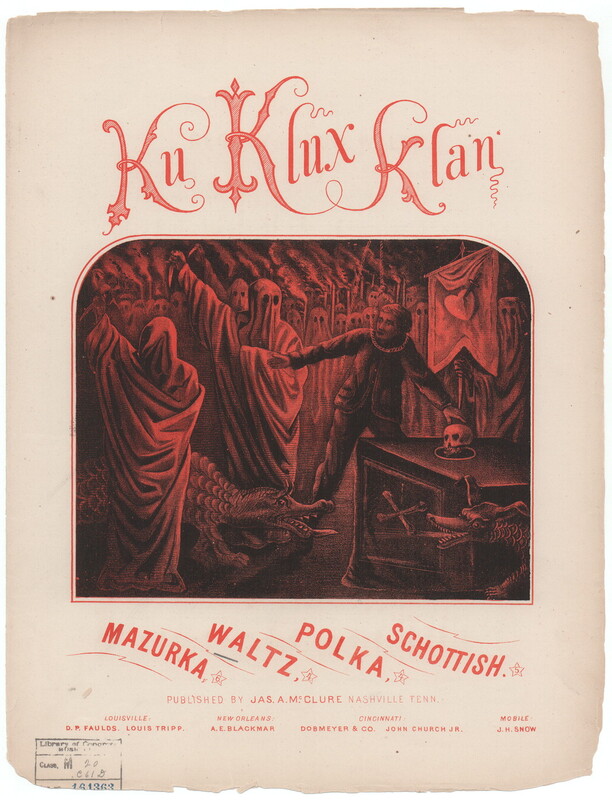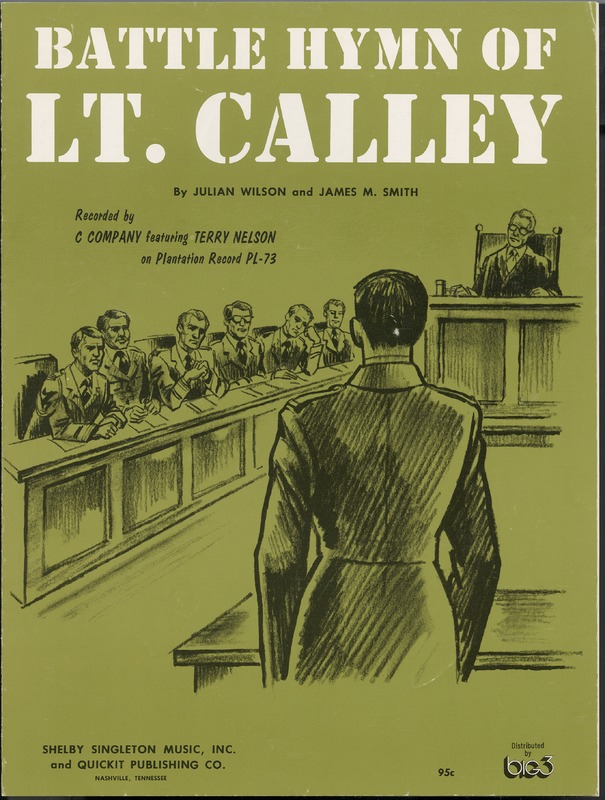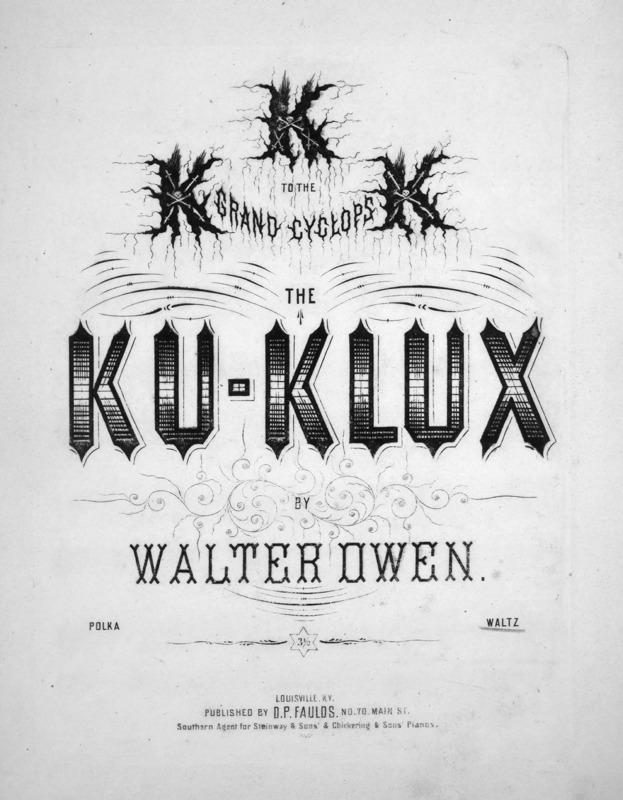Ku Klux Klan
Music has served numerous functions throughout the history of the Ku Klux Klan. Songs were used for recruitment, social functions, propaganda, and ceremony. The music below is organized according to the themes outlined in the introduction of this exhibit, and are largely found in Danny Crew's "Ku Klux Klan Sheet Music- An Illustrated Catalogue of Published Music."
Content warning: This page contains uncensored racist language.
Biological Superiority
While minstrel shows implied the biological superiority of white people by depicting African Americans as lazy and unintelligent, the Klan was more explicit in its calls for a distinct white race. In a song called 'Mystic City,' the chorus claims "To God and Old Glory we bend the knee, sublime lineage written in history sands." This idea of 'sublime lineage' or unique ancestry can be found in white supremacist circles today-- many contemporary white supremacists even claim direct lineage to powerful Norse gods like Odin and Thor. Below are other examples of calls to preserve lineage in sheet music, listed after the title of each song (song titles in italics):
Junior Boys Klan Chorus
Verse 3: "Were you born across the water? Then a member you can't be."
Chorus: "We are natives, we were born this side of the sea. We will never intermarry-- America is our home."
My Black Faced Fellow
"No, you can not mix with the whites so far, for a blue eyed nigger don't look here. But for white supremacy, we surely stand, from the least to the greatest in the Ku Klux Klan."
Loss of Culture/White Genocide
Closely related to the theme of biological superiority is the fear that 'white culture' is being eroded through interracial mixing or marriage. For some white supremacists, this amounts to a 'white genocide'.
The Wreckers
Verse 1: Look Miss Liberty is weeping, my it seems her proud heart breaks. Is the nation's flag in peril, ye the statute [sic] even shakes. Working was a mob of wreckers they of many tongues and race, were a gnawing at its vitals, were a striking at its base."
Verse 3: "Some among that mob of wreckers were her sons of rank and birth, mixing, mingling with the wreckers, born on other parts of earth. And this mob of fiendish wrekers, not for reasons of their need, they would crucify their freedoms just to satisfy their greed."
Mystic City
"In this dream he saw old Glory and the cause of liberty being surplanted [sic] by a people who had come across the sea, bringing with them flags and customs belong to primeval man, to affix and plant them firmly in this, our native land."
Recruitment & Ceremony
Calls to join the Klan often refrained from the most extreme language that might turn away curious recruits. Many of the lyrics instead focused on invoking patriotism, pride, solidarity, loyalty, and fraternal bonds over calls for violence, anger, and outrage-- if the word "Klan" were replaced with "The Confederacy," much of the remaining language fits well in both movements.
Come Join the Knights of the Ku Klux Klan
Chorus: "Be a man if you are a real American, if you love to see old glory wave join this band of the free and the brave."
The Call of a Klansman
Verse 2: "If you believe in righteous liberties and the brotherhood of man, then we want you for a klansman, won't you come and join our klan?"
One ritual entitled 'closing ceremony' says, "Blest be the Klansman's tie of real fraternal love, that binds us in a fellowship akin to that above."
Religion
Antisemitism and anti-catholicism were heavily featured in songs of the Klan. One warns, "O Jew, O Jew, my huckleberry Jew-- be careful what you do, do. The tide may turn most any time and leave you in a stew, too. So keep your tongue and hold your peace the very best you can. For somethings [sic] coming up the road that looks like the Ku Klux Klan."
The Cross in the Wildwood
Verse 2: "Each klansman has sworn to be true. He has pledged to uphold Old Glory, not to down the catholic and the jew."
Reuse of Familiar Melodies
Many songs published by the Klan were set to familiar, patriotic tunes including Yankee Doodle, Auld Lang Syne, Battle Hymn of the Republic, and Maryland, My Maryland. Battle Hymn of the Republic (Glory Hallelujah) has been repurposed hundreds of times-- as recently as the Vietnam War, it was used in a song defending Liutentant Calley-- a soldier charged in the My Lai Massacre against unarmed Vietnamese Civilians.
By setting new text to these tunes, a publisher could immediately and reliably stir up patriotic sentiments in an audience. Listen to the beginning of Battle Hymn for Liutenant Calley-- within the first 30 seconds, we hear a militaristic snare drum combined with the humble, rural, banjo. Before the narrator begins, the song aims to evoke a sympathetic state of mind-- nostalgia, pride, patriotism. While this song doesn't necessarily invoke white supremacy, it illustrates well the reuse of a patriotic tune to gloss over an atrocious act.
This song, dedicated "To the Grand Cyclops" in intimidating font, was composed by Walter Owen. It was published as both a polka and waltz in Louisville, Kentucky 1868. This places it in the first iteration of the Klan, which was originally composed of ex-Confederate soldiers. The fact that this is a dance without lyrics might imply it was used in social functions. The waltz is quite elaborately composed (perhaps inspired by the waltzes of Johann Strauss II), almost masking the fierce hatred and racism behind a beautiful melody.


